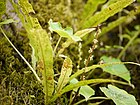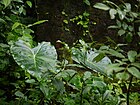Note: This is a project under development. The articles on this wiki are just being initiated and broadly incomplete. You can Help creating new pages.
Difference between revisions of "Remusatia vivipara"
| Line 2: | Line 2: | ||
==Uses== | ==Uses== | ||
{{Uses|}}, {{Uses|}}, {{Uses|}}, {{Uses|}}, {{Uses|}}, {{Uses|}}, {{Uses|}}, {{Uses|}}, {{Uses|}}, {{Uses|}}, {{Uses|}}.<ref name="Uses"/> | {{Uses|}}, {{Uses|}}, {{Uses|}}, {{Uses|}}, {{Uses|}}, {{Uses|}}, {{Uses|}}, {{Uses|}}, {{Uses|}}, {{Uses|}}, {{Uses|}}.<ref name="Uses"/> | ||
| + | |||
| + | ===Food=== | ||
| + | Remusatia vivipara can be used in Food. Tubers are boiled thoroughly and eaten. Leaves are cooked as vegetable.<ref name="Forest foods of Western Ghat"/> | ||
==Parts Used== | ==Parts Used== | ||
| Line 26: | Line 29: | ||
===Prabhava=== | ===Prabhava=== | ||
| + | |||
| + | ===Nutritional components=== | ||
| + | Remusatia vivipara Contains the Following nutritional components like - Mucilage and lectins.<ref name="Forest foods of Western Ghat"/> | ||
==Habit== | ==Habit== | ||
| Line 50: | Line 56: | ||
==How to plant/cultivate== | ==How to plant/cultivate== | ||
| − | <ref name="How to plant/cultivate"/> | + | Remusatia vivipara is available throughout the year.<ref name="How to plant/cultivate"/> |
==Commonly seen growing in areas== | ==Commonly seen growing in areas== | ||
| Line 73: | Line 79: | ||
<ref name="How to plant/cultivate">[ "Cultivation"]</ref> | <ref name="How to plant/cultivate">[ "Cultivation"]</ref> | ||
<ref name="Uses">Indian Medicinal Plants by C.P.Khare</ref> | <ref name="Uses">Indian Medicinal Plants by C.P.Khare</ref> | ||
| + | <ref name="Forest foods of Western Ghat">"Forest food for Northern region of Western Ghats" by Dr. Mandar N. Datar and Dr. Anuradha S. Upadhye, Page No.128, Published by Maharashtra Association for the Cultivation of Science (MACS) Agharkar Research Institute, Gopal Ganesh Agarkar Road, Pune</ref> | ||
</references> | </references> | ||
Latest revision as of 12:30, 16 November 2021
Contents
- 1 Uses
- 2 Parts Used
- 3 Chemical Composition
- 4 Common names
- 5 Properties
- 6 Habit
- 7 Identification
- 8 List of Ayurvedic medicine in which the herb is used
- 9 Where to get the saplings
- 10 Mode of Propagation
- 11 How to plant/cultivate
- 12 Commonly seen growing in areas
- 13 Photo Gallery
- 14 References
- 15 External Links
Uses
[[:Category:Ayurvedic Herbs known to be helpful to treat |]], [[:Category:Ayurvedic Herbs known to be helpful to treat |]], [[:Category:Ayurvedic Herbs known to be helpful to treat |]], [[:Category:Ayurvedic Herbs known to be helpful to treat |]], [[:Category:Ayurvedic Herbs known to be helpful to treat |]], [[:Category:Ayurvedic Herbs known to be helpful to treat |]], [[:Category:Ayurvedic Herbs known to be helpful to treat |]], [[:Category:Ayurvedic Herbs known to be helpful to treat |]], [[:Category:Ayurvedic Herbs known to be helpful to treat |]], [[:Category:Ayurvedic Herbs known to be helpful to treat |]], [[:Category:Ayurvedic Herbs known to be helpful to treat |]].[1]
Food
Remusatia vivipara can be used in Food. Tubers are boiled thoroughly and eaten. Leaves are cooked as vegetable.[2]
Parts Used
[[:Category:Herbs with used in medicine|]], stem, leaves, Root.
Chemical Composition
Common names
| Language | Common name |
|---|---|
| Kannada | ಕಾಡು ಗಡ್ಡೆ Kadu gadde, ಮರಕೆಸು Marakesu |
| Hindi | |
| Malayalam | Marachembu |
| Tamil | |
| Telugu | |
| Marathi | Lalkand |
| Gujarathi | |
| Punjabi | |
| Kashmiri | |
| Sanskrit | Laksmana |
| English | Hitchhiker elephant ear |
Properties
Reference: Dravya - Substance, Rasa - Taste, Guna - Qualities, Veerya - Potency, Vipaka - Post-digesion effect, Karma - Pharmacological activity, Prabhava - Therepeutics.
Dravya
Rasa
Guna
Veerya
Vipaka
Karma
Prabhava
Nutritional components
Remusatia vivipara Contains the Following nutritional components like - Mucilage and lectins.[2]
Habit
[[:Category:Habit - |]]
Identification
Leaf
| Kind | Shape | Feature |
|---|---|---|
Flower
| Type | Size | Color and composition | Stamen | More information |
|---|---|---|---|---|
| {{{5}}} |
Fruit
| Type | Size | Mass | Appearance | Seeds | More information |
|---|---|---|---|---|---|
Other features
List of Ayurvedic medicine in which the herb is used
Where to get the saplings
Mode of Propagation
[[:Category:Index of Plants which can be propagated by |]]
How to plant/cultivate
Remusatia vivipara is available throughout the year.[6]
Commonly seen growing in areas
[[:Category:Herbs that are commonly seen in the region of |]], [[:Category:Herbs that are commonly seen in the region of |]], [[:Category:Herbs that are commonly seen in the region of |]], [[:Category:Herbs that are commonly seen in the region of |]], [[:Category:Herbs that are commonly seen in the region of |]].
Photo Gallery
References
- ↑ Indian Medicinal Plants by C.P.Khare
- ↑ 2.0 2.1 "Forest food for Northern region of Western Ghats" by Dr. Mandar N. Datar and Dr. Anuradha S. Upadhye, Page No.128, Published by Maharashtra Association for the Cultivation of Science (MACS) Agharkar Research Institute, Gopal Ganesh Agarkar Road, Pune
- ↑ ["Chemistry"]
- ↑ Common names
- ↑ ["Morphology"]
- ↑ [ "Cultivation"]
External Links
- [ ]
- [ ]
- [ ]
- Ayurvedic Herbs known to be helpful to treat
- Herbs with used in medicine
- Herbs with stem used in medicine
- Herbs with leaves used in medicine
- Herbs with Root used in medicine
- Herbs with common name in Kannada
- Herbs with common name in Malayalam
- Herbs with common name in Marathi
- Herbs with common name in Sanskrit
- Herbs with common name in English
- Habit -
- Index of Plants which can be propagated by
- Herbs that are commonly seen in the region of
- Herbs



